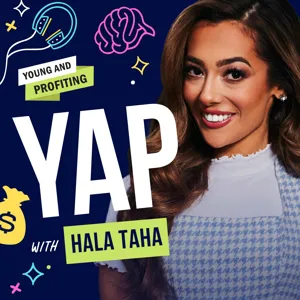Podcast Summary
Understanding the Basics of Investing in the Stock Market: Educate yourself on investing basics and start early to take advantage of tax savings and compounding growth
Investing in the stock market is a long-term strategy for building wealth, but it can be confusing for beginners. The stock market is a place where investors buy and sell parts of publicly traded companies. The difference between investing vehicles like stocks, bonds, and ETFs can be confusing, but it's essential to understand them. Delianne Barros, a money coach and Financially Inclined podcast guest, shared her personal experience of being introduced to investing through a 401k at her job. She admits to initially ignoring it, focusing instead on paying off debts and other immediate expenses. However, she encourages listeners not to put off investing, especially since the growth and compounding of investments in a tax-free Roth IRA can save money on taxes in the future. To get started, it's important to educate yourself on the basics of investing and seek out resources like Financially Inclined to help make the process simpler and more accessible.
Exploring Different Investment Options: Considering various investment options like bonds, index funds, ETFs, and mutual funds can help diversify a portfolio and potentially reduce risk.
Investing in the stock market involves more than just buying a single stock, as the outcome is uncertain. Instead, considering other investment options like bonds, index funds, ETFs, and mutual funds can help diversify your portfolio and potentially reduce risk. During the conversation, the speaker shared their personal experience of discovering the world of investing while living in New York City, unaware of the basics like stocks, index funds, and brokerage accounts. They explained how they started with a small investment to take advantage of free match money, and as they learned more, they became interested in the stock market. To help understand the concept, they compared the stock market to buying a single song from an album, emphasizing the uncertainty of choosing the winning song. They then discussed the importance of understanding various investment components, such as stocks, bonds, and different types of funds. Stocks represent ownership in a company, while bonds are loans made to companies or governments. Index funds, ETFs, and mutual funds are investment vehicles that allow investors to buy a diversified portfolio of stocks, bonds, or other assets. By investing in a mix of these components, individuals can potentially reduce risk and increase the chances of achieving their financial goals.
Investing in music or stocks involves risk and potential reward: Understand different risk levels, have a long-term perspective, and build resilience to market volatility
Investing, whether it's in music or the stock market, involves taking calculated risks. The speaker uses the example of buying a winning album or an index fund/ETF to spread the risk and potentially increase the chances of success. Bonds, on the other hand, involve lending money to entities and receiving interest. While there's a lower risk involved, the returns are also not as high. It's essential to understand the different risk levels and what's appropriate for individual investors. The speaker also emphasizes that the value of investments can fluctuate, and it's crucial to have a long-term perspective. The stock market doesn't only go up, and experiencing ups and downs is a normal part of the investment process. It's important to remember that you haven't lost money until you sell, and the money in your account is just in a constant state of change. Building resilience and a strong stomach for market volatility can be a valuable skill, especially for young investors.
Starting a retirement account early for teens: Opening a custodial Roth IRA as a teen can grow money tax-free, but choosing a stable and reliable brokerage is essential.
Starting a retirement account, specifically a custodial Roth IRA, at a young age can be beneficial to grow your money tax-free. Parents or legal guardians can open this account for minors, and it transfers to the teenager once they turn 18. However, choosing the right brokerage account is crucial, and it should be federally insured and established. Avoid new or trendy brokerages, as your hard-earned money deserves a stable and reliable home. For teens who don't want their parents involved, the custodian doesn't necessarily have to be a parent, but the legal guardian is usually the best choice. Remember, the key to success is to leave the account alone and let it grow through compounding.
Investing made easy with technology: Use discount brokers to buy index funds, evaluate financial situation before investing, and consider resources like Investopedia, NerdWallet, and MarketWatch for learning.
Technology has made investing more accessible than ever before, allowing individuals to open investment accounts and purchase index funds with just a few clicks, even on their phones. For beginners, it's recommended to use discount brokers like Fidelity, Vanguard, or Charles Schwab, rather than banks or insurance companies, which often charge higher fees. However, opening an account is just the first step. After connecting a checking account, the next step is to actually purchase an investment, such as an index fund. It's important to note that the investment account itself is not the investment, and there are numerous options to choose from, which can be overwhelming. Instead, many experts recommend buying the whole market through an index fund. Some trusted resources for learning more about investing include Investopedia, NerdWallet, and MarketWatch. Even if you have debt, investing can still be a consideration, but it's important to evaluate your financial situation carefully before getting started.
Prioritize building an emergency fund before investing in college: Start by saving enough for three months' expenses in a savings account before investing in college, then consider various retirement and investment accounts as employment allows.
When you're heading to college, prioritize building an emergency fund before investing. Aim for at least three months' worth of expenses in a savings account. Once employed, consider contributing to a 401k or similar retirement account, a Roth IRA, or a regular brokerage account. Each account type offers different benefits and restrictions. Learning the vocabulary and understanding the rules of these investment accounts is crucial, and it's never too early to start. Despite initial intimidation, investing is largely about vocabulary and understanding the different account types. Start by learning the language of investing to prepare for future financial decisions.
Exploring Different Investment Options and the Importance of Financial Literacy: Research various investment options like stocks, bonds, and ETFs, and continue learning about money to make informed decisions. Listen to 'Million Bazillion' to help kids understand complex financial concepts.
Understanding financial terms and concepts is essential for making informed decisions about your money. In this episode, we discussed various investment options such as stocks, bonds, and ETFs. We encouraged listeners to research and consider which investment might be best for their financial goals. Additionally, we mentioned the importance of continuing to learn about money, even at a young age, and introduced "Million Bazillion," a podcast designed to help kids understand complex financial questions. Overall, the episode emphasized the importance of financial literacy and the resources available to help individuals of all ages make sense of the world of money. Remember, your feedback and reviews are greatly appreciated, and we'll be back soon with more financial insights. Financially Inclined is made possible by the support of organizations like the Cy Sims Foundation and the Ranzetta Family Charitable Fund.






